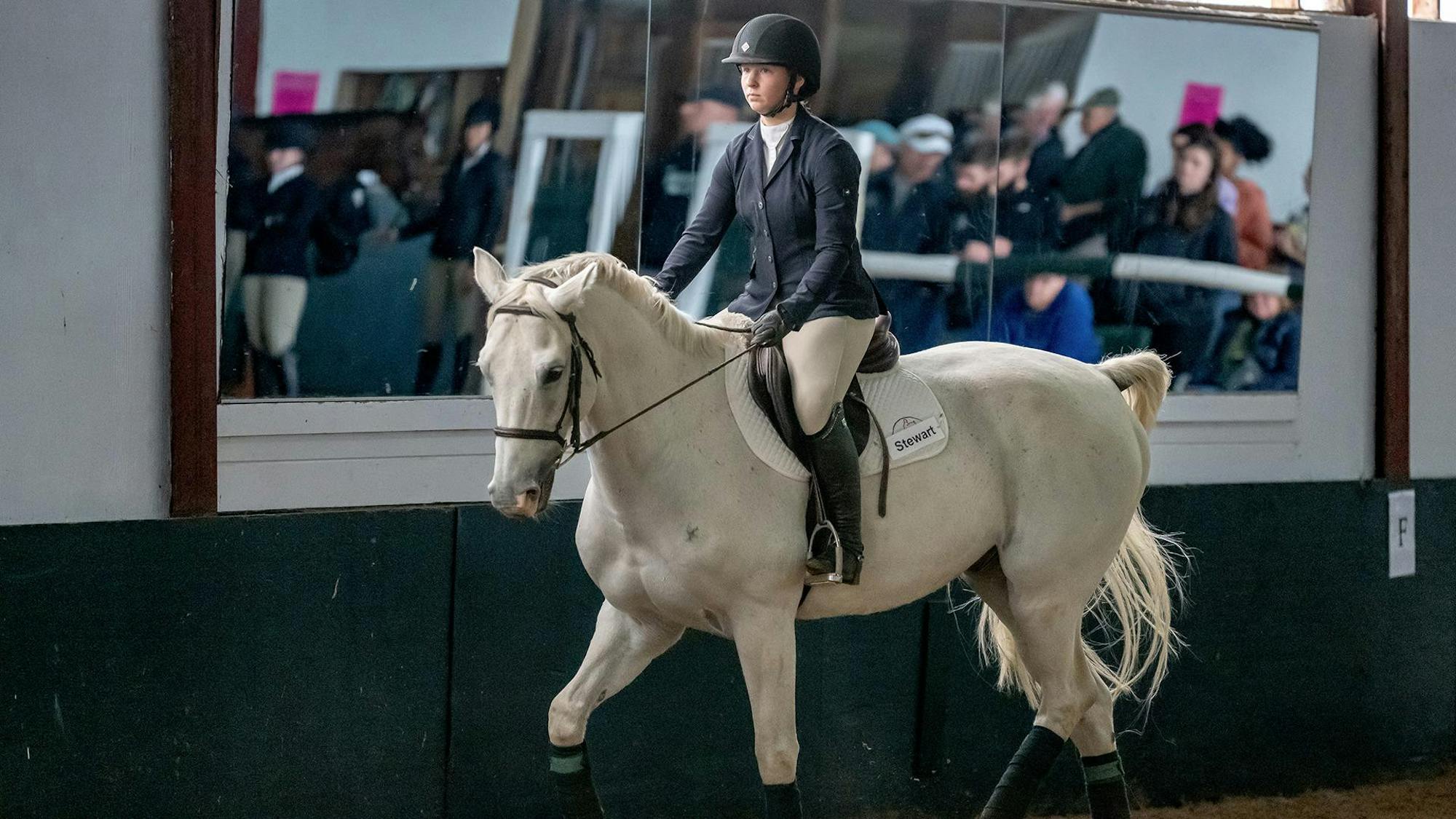Rachel Freer ’24 and Margot Luria ’24 –– co-captains of the equestrian team –– look forward to continuing the team’s upward trajectory after defeating Stonehill College in a scrimmage on on Sept. 30. The victory was an indication of the progress the team has made on all fronts since last year, according to Luria.
The team now has a full year of National Collegiate Equestrian Association competition under its belt, which was a brand new format for most riders.
“I’m really proud of how the team competed and worked together at the season opener,” Luria wrote in an email statement. “After taking a season to get comfortable with a new format, I think everyone is set up really well to be nationally competitive this year and to put in some great rides.”
In the NCEA, riders go head-to-head on the same horse, which is drawn at random on the day of the meet. Compared to most pre- and post-collegiate riding, where riders have the same barn of horses which they ride at all meets, this format requires a lot of practice with adapting to new horse styles and personalities. It also means no rider can gain a distinct advantage due to their horse.
“The purpose is to ensure a level playing field,” Head coach Tenley Walsh said. “It really does kind of provide the best opportunity to see the athlete’s ability uninfluenced by the horse, so it’s a really fun format.”
Transitioning to this format has been a challenge; however, according to Luria, the team has improved in their preparation for meets by playing to individual strengths. Along with the added NCEA experience, this is the first year that Dartmouth can recruit equestrian athletes, allowing the team to bring in new talent.
“Being able to see that transition over the last four years of not only talent, but also the horses that [Walsh] has brought in, has been really invigorating,” Freer said.
Luria and Freer are making the most out of leading the young group during this transitional period. Having drawn on experience from their past three captains, the two leaders see this as an opportunity to set a positive precedent for the program.
“I’ve learned that good teammates advocate for each other in every sense of the word,” Luria wrote. “As a captain, I hope that I can be an extremely supportive voice in the room for each and every girl on this team.”
Their efforts were acknowledged by many members of the team, including Cassidy Exner ’27. Exner described how Freer and Luria have answered any questions the first-years have through regular FaceTimes and a group chat. This leadership filters down to all members of the group, with all 11 members, coaches and staff collaborating in helping each other both in and out of the sport.
“They’ve been awesome,” Exner said. “It’s been great to know that I can talk to [Freer] or [Luria] about anything.”
Having joined the team during the pandemic and experiencing the change in rules for competition, the captains reflected on the circumstances of their last year on the team.
“Coming into a leadership position this year has been a culminating part of Dartmouth for me,” Freer said. “Because I feel like I’ve seen the trials and the errors and being the new ones in the league, I can see how much we’ve grown.”
Freer and Luria are making sure to enjoy their last year with the team. As they are unsure regarding the future of their equestrian careers, the co-captains are keen on making every moment with their horses, teammates and coaches count.
“'I’m trying to just get the most out of every single ride because I know I'm going to have to take a break for a while,” Freer said.
There is still much to look forward to for the team, which will face off against back-to-back defending NCEA champions –– the University of Lynchburg –– at Morton Farm this weekend. The Big Green looks forward to this challenge, having lost to the champions in last year’s season opener.
“It’s a hard meet to kick the season off with,” Walsh said. “But I think it’ll be a really good indicator of where we are and how much growth we’ve had from last year… there is so much potential.”
The Big Green will ultimately host five meets during the fall competition season, and then they will travel to Texas A&M University in January and Auburn University in February –– the second time the Big Green will face off against the Tigers in program history. These trips offer exciting opportunities for the team to impress viewers on a national level and potentially reach the NCEA National Championships in April that are held at World Equestrian Center in Ocala, Florida. Regardless of the performances at meets, it is clear that the equestrian program is starting to build something special.
“The equestrian program has gained so much traction over the past few years as it has moved into the NCEA format,” Luria wrote. “I am excited to see how the program becomes ingrained in the league moving forward.”
Sid Singh ’27 is a sports editor and reporter. He is from Bethesda, Md. and Singapore and is majoring in Economics and Quantitative Social Science. Sid is also an engagement manager for Consult Your Community and a member of the Raaz dance team.




